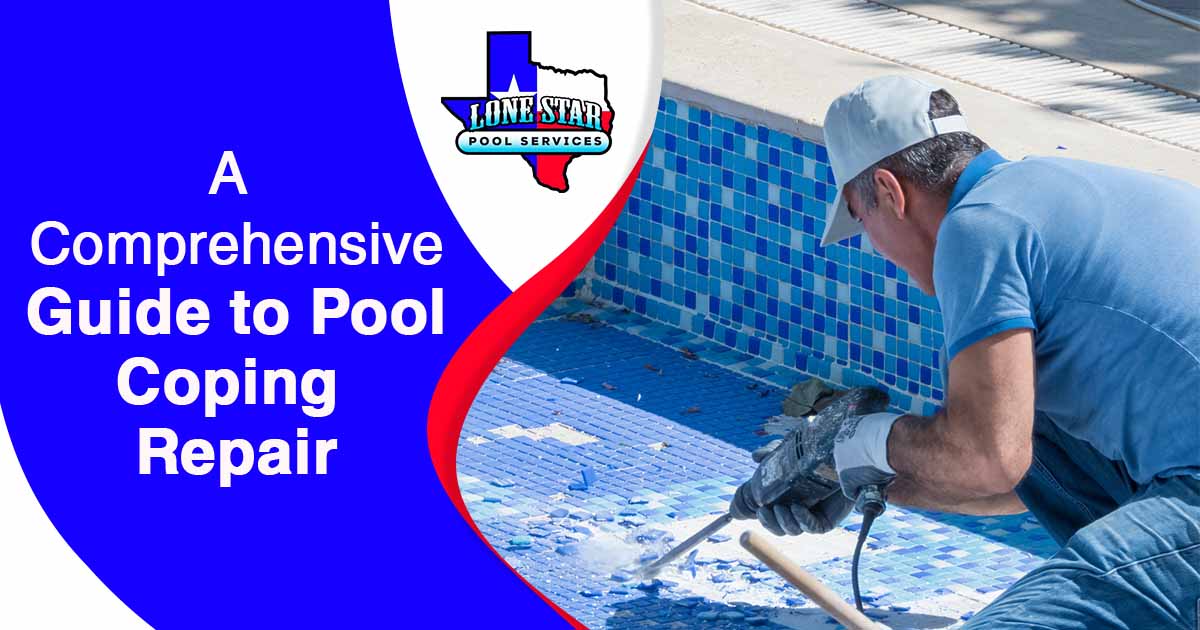Owning a swimming pool is a fantastic way to relax and make the most of the summer season. However, it also comes with the responsibility of regular upkeep. A crucial part of this maintenance involves ensuring the pool’s coping is maintained and in good condition.
Our team at Lone Star Pool Services has put together this comprehensive guide to help you maintain your pool coping effectively. We’ll discuss the importance of swimming pool coping, signs of damage, potential repercussions of ignoring damaged coping, and more.
What is Swimming Pool Coping?
Swimming pool coping refers to the material around the edge of your pool that serves as a transition from the pool shell to the deck. It plays a significant role in preventing water from leaking into unwanted areas. However, over time, the coping can wear down, leading to cracks or other damage that warrant repair.
Swimming pool coping is an important element of your swimming pool that helps keep it safe and structurally sound. Apart from its practical function, swimming pool coping also enhances the aesthetic appeal of your pool by providing a decorative border around the edge.
Identifying Early Signs of Coping Damage
To ensure your pool coping remains in pristine condition, it’s important to regularly check for signs of damage. Early warning signs might include cracks, chips, or crumbling of the coping material. Discoloration or fading could also indicate excessive exposure to sunlight.
Potential Causes of Swimming Pool Coping Damage
Swimming pool coping can be damaged due to a variety of reasons. Environmental factors and poor maintenance practices often play a significant role. For instance, fluctuating weather conditions can lead to the expansion and contraction of concrete pool decks, which can damage the coping.
Additionally, if the pool or soil underneath shifts due to geological changes or heavy loads, it may result in cracking or movement. Other common causes include general wear and tear from people using the pool, and water infiltration which can cause materials like concrete to crumble over time.
In some cases, the material used in the decking may also be a factor, as certain materials may be more prone to cracking than others. Finally, underlying issues with the pool structure or installation process can also lead to coping damage.
It’s important to regularly inspect the pool coping for signs of damage and address any issues promptly to maintain the safety and aesthetics of the pool.
What if Coping Damage Isn’t Repaired?
Ignoring pool coping damage can lead to a host of problems. Unaddressed damage can allow water to seep into areas where it shouldn’t, such as the soil around the pool. This water infiltration can weaken the structure of your pool and surrounding area, leading to more damage and structural problems.
Additionally, damaged coping can cause the edges of your pool to be less secure and may even lead to cracking or crumbling of the decking material. Sharp edges of broken coping can also be a hazard for swimmers, so it’s important to address any damage immediately. Damaged coping can be a serious safety hazard and, if left unrepaired, may require more costly repairs.
Can I Fix Coping Damage Myself?
The good news is, not all coping repairs require a professional. Basic repair jobs such as patching small cracks or chips can often be done at home with the right tools and materials.
However, for major damage such as sinking edges or significant cracking of the coping material, it’s advisable to call in a professional pool repair company. Professionals possess the necessary skills and equipment to assess the damage and perform repairs efficiently and safely.
What Happens During Pool Coping Repair?
Professional pool repair technicians usually begin the repair process by assessing the damage to determine the necessary repairs. They inspect the pool coping to identify any cracks, chips, crumbling sections, or other signs of damage.
The next step is to remove the damaged sections of the coping. If there is only minor damage such as small cracks or chips, the pool repair technician may be able to repair these without replacing the coping.
However, in cases where extensive repairs are required, the professional may need to replace some or all of the coping. Once all the necessary repairs are completed, the professional will seal any remaining areas and provide regular maintenance to ensure your pool stays in top condition.
How Long Do Pool Coping Repairs Take?
The time it takes to complete pool coping repairs depends on the extent of the damage. Minor repairs such as patching small cracks or chips can often be completed in a few hours, whereas more extensive repairs may take several days or even weeks.
It’s important to work with an honest and reputable pool repair company like Lone Star Pool Services that can provide quality workmanship and guarantee their work. This will ensure that your pool coping is properly repaired and will remain in top condition for years to come.
How to Prevent Pool Coping Damage
One of the best ways to prevent or delay pool coping damage is through proper maintenance. Regularly inspecting the coping for any signs of damage and addressing issues promptly is essential to keeping it in top condition. Additionally, there are a few steps you can take to reduce the risk of damage and ensure that your pool coping stays in good condition for longer.
- Regular Inspections: Regularly inspect the pool coping for signs of damage like cracking, chipping, crumbling, or discoloration.
- Prompt Repairs: Address any signs of damage immediately to prevent further deterioration and structural issues.
- Proper Maintenance: Follow recommended maintenance practices such as using proper cleaning products and avoiding abrasive cleaners that can cause damage to the pool’s surface.
- Quality Materials: Select durable and long-lasting materials when replacing swimming pool coping or decking in order to ensure they can withstand fluctuations in temperature and weather conditions over time without becoming damaged too quickly.
- Professional Assistance: For extensive repairs, hire a professional to ensure accurate assessment and effective repairs.
- Consistent Water Levels: Maintain consistent water levels throughout the season to help reduce pressure on the walls and prevent cracking.
- Pest and Debris Control: Maintain a clean and well-maintained pool to avoid pests and debris that might contribute to structural damage.
Lone Star Pool Services: Your Go-to for Pool Coping Repair
Pool coping is an important component in the structural integrity of your swimming pool. Properly maintained coping ensures your pool remains safe for years to come. If you notice signs of damage, seek out a professional consultation right away to prevent further deterioration and costly repairs. With regular inspections, timely maintenance, and quality materials, you can keep your pool in top condition for years to come.
By adhering to these tips, you can not only maintain the structural integrity of your pool but also ensure it remains a safe and beautiful place to enjoy for years to come.

